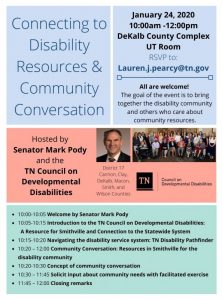News
DCHS Teams Defeat Visiting Smith County
January 22, 2020
By: Dwayne Page
The DCHS basketball teams swept visiting Smith County Tuesday night in Smithville. The Lady Tigers won in overtime 59 to 52 while the Tigers claimed an 80 to 54 victory.
The Lady Tigers trailed 7 to 4 after the 1st period but held a 20 to 19 edge by halftime. Smith County was back out front 34 to 33 after the 3rd period but the game was tied at 48 by the end of regulation. The Lady Tigers outscored Smith County 11 to 4 in the overtime period and won 59 to 52.
Emme Colwell scored 16. Kadee Ferrell 12. Gracie Griffin and Summer Crook each with 8. Mya Ruch 6 and Megan Walker, Megan Cantrell, and Hannah Willingham each scored 3.
The Tigers led 15 to 10 after the 1st period, 33 to 22 at halftime, and 57 to 36 after the 3rd period before going on to win 80 to 54.
Evan Jones scored 17, Dakota White 13, Elisha Ramos 12, Brayden Antoniak 9, Luke Jenkins 8, Jordan Young and Dallas Cook each with 7, Kylan Rhea 4, Stetson Agee 2, and Conner Vance 1.
The Tigers have a record of 6-13 (3-4 in the district) while the Lady Tigers are now 10-10 and (3-4 in the district).
The remainder of the 2020 schedule is as follows:
Friday, January 24: York Institute*-Away 6 p.m.
Monday, January 27: Warren County-Away 6 p.m.
Tuesday, January 28: Livingston Academy*-Away 6 p.m.
Friday, January 31: Watertown*-Home 6 p.m.
Tuesday, February 4: Cannon County- Away 6 p.m.
Friday, February 7: Upperman- Home 6 p.m..
Tuesday, February 11: Macon County*-Away 6 p.m.
Thursday, February 13: Smith County*-Away 6 p.m.
Senator Pody and Council on Developmental Disabilities Host Local Disability Resource Event
January 22, 2020
By: Dwayne Page
The Tennessee Council on Developmental Disabilities is partnering with Senator Mark Pody to host a Smithville disability resource event for people with disabilities, their families and neighbors, local businesses, educators, and community leaders.
“I asked the Council to co-host this event to help our community connect to disability resources, but also to start conversations about how we can work together to make Smithville a welcoming place for all citizens to live, work, play, and contribute,” Pody said.
“We have so many assets right here in Smithville. Conversations like this can open new doors to opportunity and growth for people with disabilities and for our entire community.”
The event will be on Friday, January 24, 10 a.m. to noon at the DeKalb County Complex UT Room. It is free and open to the public. Snacks will be provided.
Attendees will learn about disability resources and join in conversations with community leaders about how Smithville can continue to grow as an inclusive place for people with disabilities to thrive.
“We are thrilled to have this opportunity to join Senator Pody in Smithville,” Council Public Policy Director Lauren Pearcy said. “Every one of us is connected to disability in some way, and we all benefit from inclusive communities. The Council is here to support Smithville in growing opportunities for citizens with disabilities.”
For more information about the event, contact Lauren Pearcy at lauren.j.pearcy@tn.gov, or 615-741-5019.
About the Council on Developmental Disabilities
The Tennessee Council on Developmental Disabilities is a state agency established to improve disability policies and practice, educate policymakers and the public, and build collaboration to create lasting, positive change for Tennesseans with disabilities and their families. The Council is the only state agency tasked with looking at how all the pieces of our disability system work together, identifying areas of need, and bringing different parts of government and outside groups together to tackle challenges and improve state services. For more information, visit www.tn.gov/cdd or follow us on Twitter (@TNCouncilDD) or Facebook.
US Census Bureau to Contact You by Mid-March for the 2020 Count
January 22, 2020
By: Dwayne Page
In mid-March, homes across the country will begin receiving invitations to complete the 2020 Census. Once the invitation arrives, you should respond for your home in one of three ways: online, by phone, or by mail.
The 2020 Census counts every person living in the 50 states, District of Columbia, and five U.S. territories.
The count is mandated by the Constitution and conducted by the U.S. Census Bureau, a nonpartisan government agency. The 2020 Census counts the population in all 50 states, the District of Columbia, and five U.S. territories (Puerto Rico, American Samoa, the Commonwealth of the Northern Mariana Islands, Guam, and the U.S. Virgin Islands). Each home will receive an invitation to respond to a short questionnaire—online, by phone, or by mail.
The census provides critical data that lawmakers, business owners, teachers, and many others use to provide daily services, products, and support for you and your community. Every year, billions of dollars in federal funding go to hospitals, fire departments, schools, roads, and other resources based on census data.
The results of the census also determine the number of seats each state will have in the U.S. House of Representatives, and they are used to draw congressional and state legislative districts.
It’s also in the Constitution: Article 1, Section 2, mandates that the country conduct a count of its population once every 10 years. The 2020 Census will mark the 24th time that the country has counted its population since 1790.
Counting every person living in the United States is a massive undertaking, and efforts begin years in advance. Here’s a look at some of the key dates along the way:
2020
March 12 – 20: Households will begin receiving official Census Bureau mail with detailed information on how to respond to the 2020 Census online, by phone, or by mail.
March 30 – April 1: The Census Bureau will count people who are experiencing homelessness over these three days. As part of this process, the Census Bureau counts people in shelters, at soup kitchens and mobile food vans, on the streets, and at non-sheltered, outdoor locations such as tent encampments.
April 1: Census Day is observed nationwide. By this date, every home will receive an invitation to participate in the 2020 Census. Once the invitation arrives, you should respond for your home in one of three ways: online, by phone, or by mail. When you respond to the census, you’ll tell the Census Bureau where you live as of April 1, 2020.
April: Census takers will begin visiting college students who live on campus, people living in senior centers, and others who live among large groups of people. Census takers also begin conducting quality check interviews to help ensure an accurate count.
May – July: Census takers will begin visiting homes that haven’t responded to the 2020 Census to help make sure everyone is counted.
December: The Census Bureau will deliver apportionment counts to the President and Congress as required by law.
The U.S. Census Bureau is ramping up its national recruiting efforts to hire up to 500,000 temporary, part-time census takers for the 2020 Census in communities across the country to reach its goal of more than 2 million applicants.
The positions offer competitive pay, flexible hours, paid training, and weekly paychecks. To determine the pay rate in a specific area, learn more about these positions, or apply for one of the temporary jobs, visit 2020census.gov/jobs.
Anyone age 18 and older, such as recent high school graduates, college students, veterans, retirees, military spouses, seasonal workers and people who are bilingual are highly encouraged to apply. People who already have jobs and want to earn extra income evenings and weekends are also encouraged to apply. The selection process begins this month, with paid training occurring in March and April. After paid training, most positions work between May and early July.
« First ‹ Previous 1 1523 1613 1621 1622 16231624 1625 1633 1723 2504 Next › Last »













